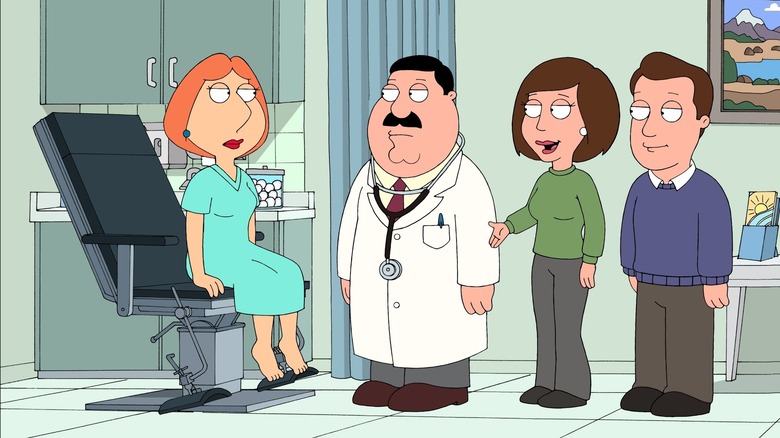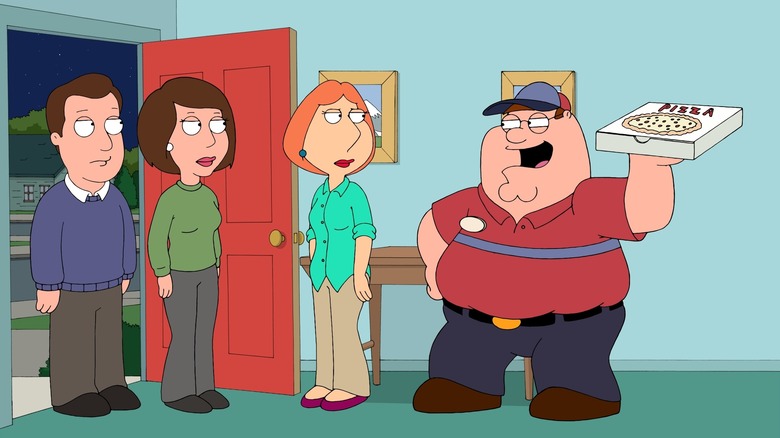Why The Family Guy Episode 'Partial Terms Of Endearment' Was Banned In America
Some of the most scabrous moments on television over the last 30 years has come via animated series. "The Simpsons," "South Park," and "King of the Hill" were more daring in attacking verboten subject matter than possibly any live-action sitcom of their era. They dealt with issues like racism, sexism, queer rights, and the AIDS epidemic in ways that weren't easily boiled down to a gift-wrapped lesson at the end of the episode — and they did so hilariously. And you never felt bad about laughing because the shows were clearly written by people with a moral compass (though sometimes it was hard to tell where true north was with the "South Park" gang).
One show that's pushed every bit as hard as "South Park," if not harder at times, is "Family Guy." Created by Seth MacFarlane, "Family Guy" has been blowtorching viewers' sensibilities for 25 years as it follows the absurd ups and downs of the Griffin family. The show clearly has a left-leaning bent (in keeping with MacFarlane's politics), but it can be shockingly mean-spirited at times. Indeed, its anything-for-a-laugh ethos occasionally obscures the purpose of its satire.
Whether this lends the show a necessary sense of danger or undermines its intent is a call you'll have to make. What you can't dispute, however, is that when the series sets its sights on a controversial topic, it blasts away with impunity and deals with the fallout after the episode is broadcast — if it's broadcast, that is.
Indeed, twice in the 23-season history of "Family Guy," the higher-ups at Fox have declined to air an episode to avoid blowback from certain communities. Unsurprisingly, one of these episodes dealt with abortion.
Can abortion be funny? Family Guy creator Seth MacFarlane thinks so
The banned "Family Guy" outing in question came at the end of the series' eighth season, when MacFarlane and company decided to attack the issue of abortion via an episode titled "Partial Terms of Endearment." That title should give you an idea of how irreverently the show tackles the subject. What it might not prepare you for is a deftly plotted (for "Family Guy") story in which Lois Griffin becomes a surrogate mother for an old college friend and her husband. When the couple are killed in an accident, Lois must decide between carrying the fetus to term and putting the baby up for adoption or getting an abortion.
Peter is, of course, wrong at every juncture (he gets whipped up into an anti-abortion frenzy by anti-choice activists), but Lois, after genuinely struggling with her decision, finally opts for an abortion.
Fox refused to air the episode in 2010 and has never broadcast it, though it has been released on DVD and Blu-ray. In an interview with The New York Times, MacFarlane once expressed contentment with the arrangement he has with Fox, noting that the network gave the show's creatives the go-ahead to produce the episode with the caveat that the network could always decline to air it. MacFarlane thought the fact that it was a comedic treatment of a very thorny subject did the series in. As he told the NYT, "I've got to believe that if this were an episode of "House," it probably would have aired."
The other "Family Guy" episode to be held from broadcast was the 2000 satire of antisemitism titled "When You Wish Upon a Weinstein" (it eventually aired in 2004). No, it had nothing to do with the convicted rapist Harvey Weinstein, though you shouldn't be surprised at all to learn that "Family Guy" has used that foul beast as a villain in multiple episodes.

